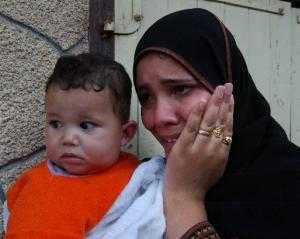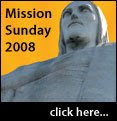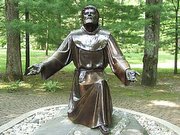8th Station: Jesus speaks to the women of Jerusalem
 He looks so peaceful as he sleeps in my arms. He is beautiful and, even in his sleep, his tiny fingers constantly curl and uncurl. My baby is but two months old, my firstborn. It is as if I have never known happiness until this moment, so great is the joy that he has brought to me. My days and my nights are filled with the thought of how blessed I am to have such a child.
He looks so peaceful as he sleeps in my arms. He is beautiful and, even in his sleep, his tiny fingers constantly curl and uncurl. My baby is but two months old, my firstborn. It is as if I have never known happiness until this moment, so great is the joy that he has brought to me. My days and my nights are filled with the thought of how blessed I am to have such a child.
Yet, earlier today, I saw a mother who must have known a similar joy and now knows a pain beyond anything that could be borne by any other.
Yes. I witnessed Jesus of Nazareth as he trod the Via Crucis towards Calvary. The sight was dreadful, but, as a new mother, the sight that initially touched me even more deeply was his mother. I could identify with her because Jesus was her baby just as much as the sleeping infant in my arms is mine.
I have never spoken to Mary, but I am familiar with her appearance because my friend Sarah pointed her out to me on several occasions when Jesus came to Jerusalem. There is nothing that particularly marks her out from other women, except for her graciousness and kindness. In a crowd, nobody would automatically look towards her and identify her as being different from anybody else. That is why, I suppose, she was able to mingle with the mob earlier on today.
Yet, had anybody looked into her face, as I did, they would have seen that her anguish was unutterably deep, that the man stumbling along the road had to be her son and that she could only be his mother. She looked absolutely ashen, stressed out and utterly helpless to change the course of events.
It is a look I have seen before on the faces of the mothers of those condemned to crucifixion, especially if they were innocent of any crime. The mothers of hardened criminals had a strange sense of inevitability about their agony. They knew that their sons had committed some crime or other and were atoning for their misdemeanours. The mothers of the innocent wore a tragic desperation in their faces: something was happening that should not be happening and there was nothing that could be done to halt the undeserved barbarity. That was the same look in the eyes of Mary.
Those whose sons were guiltless hold a despair, torment and vulnerability about them that would cause any judge’s heart to soften: even that of Pilate, but, then, he was driven by political expediency as he passed his judgement on Jesus. Pilate knew what he was doing, and so did Annas, Caiaphas and Herod.
I had not intended to witness the journey of Jesus towards Calvary. My friends and I had been gathered around the well very close to the Via Crucis. A well, as you must know, is almost the centre of a woman’s life in any village or town. It is the place for meeting, sharing news, joys and sorrows, whilst usefully drawing water for the family’s needs. There are usually several women at the well at any one time, each waiting her turn, and so it is inevitable that a conversation starts, grows and develops. Each brings along her youngest children who cannot be left unattended. There is great amusement as the toddlers see each other and start, on faltering steps, to move towards each other. It never ceases to amaze me the way in which small children identify each other, even before they have spoken their first word.
As usual we were gathered around the well, chatting, when we heard the low rumble of a crowd on the move, a unique sound that is punctuated by one or more voices occasionally rising above the others. The noise appeared to be coming from the Via Crucis, so we gathered together our children and water jugs, heading towards the cause of our curiosity. We were not harsh or looking for a spectacle: we were simply women whose humdrum, monotonous lives sometimes need something that is a little different from normal, something else that can be a topic of conversation.
I saw Mary before I saw Jesus. I was shocked to realise that her Son must be the reason for the cavalcade. I had listened to Jesus on several occasions and had enjoyed his words, for he seemed to favour especially those who are poor and disadvantaged. I did not always agree with him because he spoke of a reality that he could see but we could not. “Blessed are the poor…” Since when? Well, perhaps our struggle to survive will earn us the kingdom of Heaven, but some of those who are poor are also shiftless, lazy and not too honest in their dealings with others. Perhaps Jesus had a deeper meaning that I could not perceive. I do not know.
The sight of Jesus and Mary cut my friends and me to the quick. I pulled my baby closer to my breast as if I wanted to protect him from the sight that he is too young to see. The other mothers did the same with their children, although one or two of the little ones managed to peep out under their mother’s cloak. We suddenly did not want to be present, wanted to be anywhere other than the Via Crucis, witnesses to someone suffering who did not deserve his fate.
Jesus saw us and, even in his agony, spoke to us. “Weep not for me, but for yourselves and for your children.”
What did he mean?
I am frightened. I sit here with my beloved baby, for whom I would give my life. Did Jesus foresee something to which I am blind? What was he saying?
Almighty Father, open the eyes of my mind. Give me understanding so that I might protect my baby as Mary wanted to defend hers. What did Jesus mean by his words?

